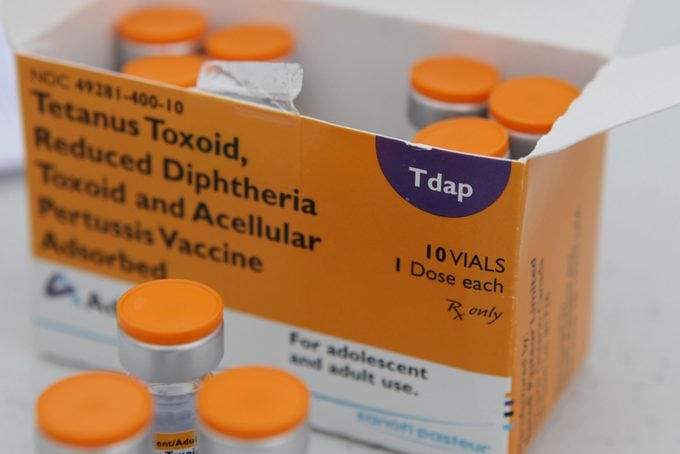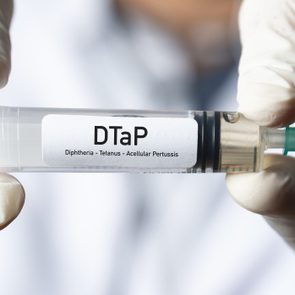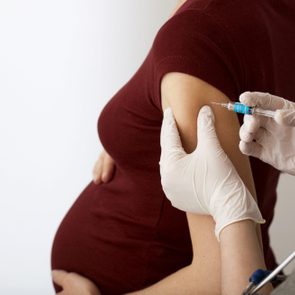11 Things You Should Know About Tdap Vaccines
Updated: Jul. 12, 2021
Here are the side effects, cost, and other important things to know about the Tdap vaccines and boosters that protect against tetanus, diphtheria, and pertussis.
What to know about the pertussis vaccines
Two vaccines are approved to help prevent pertussis, the infectious disease more commonly known as whooping cough.
Both of those vaccines cover not only whooping cough, but two other diseases as well. They have similar names (DTaP and Tdap) and contain similar ingredients, all of which makes the vaccine landscape for whooping cough confusing, to say the least.
How do you know which one to get?
The short answer is that babies and small children get DTaP while everyone else gets Tdap. There’s more to it than that, though.
Here’s everything you need to know about the pertussis vaccines.
What does Tdap protect you from?
The Tdap vaccine protects you from tetanus, diphtheria, and pertussis. (The “a” in the acronym stands for “acellular,” the type of pertussis vaccine).
Diphtheria and pertussis are both infectious diseases that you can get from close contact with other people.
The bacterium that causes tetanus, Clostridium tetani, lives in soil. It can enter through a cut or scrape in your skin and produce a toxin that causes painful, life threatening muscle cramps.
All three bacteria can cause serious disease, even death. In children, pertussis is most serious in babies.
All three diseases are still circulating
Thanks to vaccines, cases of all of these illnesses are down significantly from 80 or so years ago, but they’re still around.
Of the three, pertussis remains the most troublesome in the United States.
The Centers for Disease Control and Prevention (CDC) registered 18,617 cases in 2019. That was down from almost 50,000 cases in 2012 but way up from 1,010 in the 1970s.
Part of the problem is that adults and adolescents often go undiagnosed, then spread the infection to young children, says Tina Q. Tan, MD, a spokesperson for the Infectious Diseases Society of America.
Meanwhile, between 2004 and 2017, there have been only two confirmed cases of diphtheria in the United States. That’s largely due to the success of the diphtheria vaccine, which has been around longer than the one for pertussis.
The infection still exists elsewhere in the world, though. “Diphtheria is only a plane ride away,” says Dr. Tan.
There are about 30 cases of tetanus annually, down from 500 to 600 in the 1940s.
(Learn about diseases you didn’t know still existed.)
How is Tdap different from DTaP?
Two main things distinguish the Tdap vs. DTaP vaccine. One is the age you get it, and the other is the strength of the components.
The DTaP vaccine is given to kids under the age of 7. Ideally, babies will get the first dose at 2 months of age, followed by another at 4 months and another two months later. Additional DTaP shots are recommended at 15 to 18 months and 4 to 6 years.
Tdap is the booster shot.
“Normally it’s recommended starting at 10 to 12 years of age and then a booster every eight to 10 years,” says Dr. Tan, who is also an infectious diseases specialist at Lurie Children’s Hospital of Chicago and professor of pediatrics at Northwestern University Feinberg School of Medicine.

What’s in the vaccines?
The capital letters in DTaP indicate high amounts of the three disease components.
“There’s more of it because we have to prime the immune system in the baby,” explains William Schaffner, MD, an infectious diseases specialist at Vanderbilt University Medical Center in Nashville. “Their immune systems have never encountered it before.”
Tdap contains lower levels of the diphtheria and pertussis components—hence the lowercase letters. That said, even adults and adolescents need to get the initial series of three DTaP shots if they’ve never been immunized before.
“If you didn’t get DTaP as a kid, then you’d need to start with DTaP even as an adolescent or adult,” says Dr. Schaffner.
It’s advised you get the Tdap vaccine during pregnancy every single time you’re expecting. It’ll protect your baby before he or she is eligible for that first shot.
Why do you need boosters?
“The vaccines that we have against pertussis or whooping cough are very good, but they’re not perfect,” explains Dr. Schaffner.
“One of the ways they’re not perfect is that the protection you get lasts solidly for about five years then begins slowly to wane, and you become susceptible again,” says Dr. Schaffner.
If you forget that booster, you may get sick, but it will be less fearsome.
“It won’t be severe, but it can still be very nasty,” says Dr. Schaffner. And you can still spread it to others who may not have as much protection.
Read more about why you need whooping cough vaccines.
Why are boosters only given every decade?
Given that Tdap gives you solid protection for about five years, why the 10-year gap between boosters? The decision was a practical one, notes Dr. Schaffner.
“We don’t have a stand-alone pertussis vaccine,” he explains. “We have an integrated three-part vaccine, so we’ve made a compromise. Every 10 years is probably too often for tetanus and not quite enough to be completely protected against pertussis.”
But it simplifies the vaccination schedule, which is can be complex, even for adults. And a simpler vaccine schedule (along with the three-in-one format) makes it more likely people will actually get immunized.
(These are the booster shots you need and aren’t getting.)
Side effects of the Tdap vaccine
Side effects for Tdap are minimal, consisting mostly of pain and redness where the needle went in and sometimes a low fever, headache, fatigue, body aches or chills, and a rash or swollen glands.
Most of these are indications that your immune system is mounting the desired response.
There are very few people who should not ever get the vaccine.
“If there’s some reason to believe that you have had a specific allergic reaction to this vaccine—and that’s very, very, very rare—then we would not recommend you receive the vaccine,” says Dr. Schaffner.
One brand of the Tdap vaccine, called Adacel, is the only Tdap vaccine available in a syringe made without latex. If you have a latex allergy, check which type of shot you’re getting.
There are no long-term negative effects
While autism is a serious lifelong condition and rates have been increasing, this is not due to the DTaP, Tdap, or any other vaccine.
“These are important concerns that have been investigated time and time and time again, and there’s a whole stack now of studies to indicate that the entire childhood vaccination series neither predisposes to nor aggravates in any way an autistic condition,” says Dr. Schaffner.
Increased diagnoses of autism are likely due to increased awareness about the condition as well as increased knowledge of autism and its subtypes, he adds.
How much does it cost?
Most health insurance plans, including government-sponsored plans, should cover Tdap, says Dr. Schaffner.
Be aware of one loophole in Medicare coverage. DTaP and Tdap are not included in Medicare Part B, which is what most people get. Medicare Part D, the prescription drug plan in which fewer people enroll in, does cover the shots.
But even when Tdap is covered, it’s not covered as a preventive health service, only as a treatment. That means your Medicare plan will pay for it if you receive a shot after an injury or cut, but it won’t cover the routine 10-year boosters.
At Walgreens, the shot without insurance costs $75.
Where to get the Tdap vaccine
Tdap vaccines are widely available, not only at your doctors’ offices but also at corner pharmacies like CVS and Walgreen’s, grocery stores, and Walmart.
Make sure that you’re getting the Tdap vaccine and not the Td vaccine, which only protects you against tetanus and diphtheria.
An older vaccine, Td is not used as often anymore, but it still exists.
(These are the travel vaccinations you should know about.)
Why you should get the Tdap shot
While you may personally have not seen any cases of whooping cough lately, they’re out there and they can be life-threatening. So you may think you don’t need a vaccine, but you do. Not just for yourself but for others.
“That’s a very dangerous line of thinking,” says Dr. Schaffner. “If you don’t get vaccinated, it means you’re susceptible.”
Getting vaccinated also keeps community immunity (herd immunity) high so that people who can’t be vaccinated (like babies) are safe as well.
The vaccine remains the best way to protect against whooping cough. We have vaccination to thank for the fact that the condition isn’t as rampant as it was in history.
Next, learn how pertussis is treated.

















